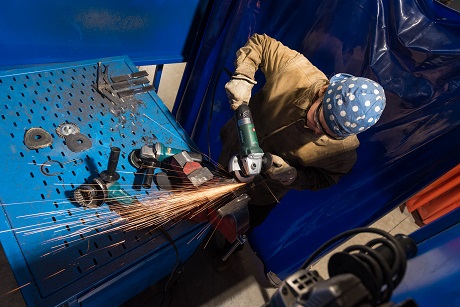The Power of Manufacturing
The manufacturing program at COCC provides strong tools for building rewarding, hands-on
careers
There’s a potent epidemic currently sweeping across the nation—and the cure is, quite
literally, in our hands.
“Anywhere we look across the United States, we are all facing the skills gap epidemic,”
said Chris Baughman, director of COCC’s manufacturing program, citing a workforce shortage that’s eroding the labor and manufacturing base in America.
Carpenters, machinists, welders and a broad swath of other hands-on trades are in
fast decline as waves of skilled workers from the boomer generation are retiring at
a fast clip, easily outpacing their replacements. The new global economy, meanwhile,
is pulling younger workers into info-based professions. And, sure, automation is changing
how things get made—but it doesn’t preclude having skilled manufacturers in the workplace.
“I’ve called back eight companies this morning,” said Baughman, a former industrial
welder himself, who is constantly fielding queries from regional businesses in need
of quality workers. Each, he said, is trying to fill a full-time spot.
The college offers a full toolbox of credentials. These include an Associate of Applied Science degree, and certificates in computer numerical control (CNC) machining, manual machining, industrial maintenance, manufacturing technology, quality assurance and welding.
“I’ve called back eight companies this morning,” said Baughman, a former industrial welder himself, who is constantly fielding queries from regional businesses in need of quality workers. Each, he said, is trying to fill a full-time spot.
Sonja Alridge, who graduated from COCC this year, didn’t set out to earn a welding
certificate. She had a comfortable job as a CADD drafter, but imagined an opportunity
that would take her beyond a desk, something with both creative and physical outlets.
“I took all the shop classes back in high school,” she shared, “and remembered how
much I enjoyed them. I had just planned to take a few classes for fun—but fell in
love with welding and ended up going for the certificate.”
These days, she’s part of the PCC Schlosser team, a Redmond manufacturer of titanium
alloy parts, where an internship—put in place before she even graduated—helped get
her started as a weld finisher, grinding out imperfections. Soon, she’ll transition
to welder, a position she’s thrilled to launch into.
Making the leap from drafter to welder—or taking on any new career for that matter—doesn’t
happen without some trepidation. But the manufacturing education at COCC, with its
flexible program design and experienced staff, allowed Alridge to build skills and
confidence simultaneously.
“It was intimidating at first,” she admitted, “but Chris and the staff are always
there to instruct you and help you every step of the way. By the end of the welding program,
I walked around the shop with confidence that I knew how to use any welding machine,
cutting tool, grinder and all the other equipment.”
Brandon Crosby, who graduated in 2017 with a CNC machining certificate, works at
Bend’s ISCO Manufacturing Solutions. The company creates things for the aerospace
and medical industries, among other specialties, and Crosby works a CNC waterjet,
cutting parts with high-pressure water technology. Sometimes he operates a CNC lathe.
“I was a chef for five years before I decided to go to school, and Dan and Chris made
this transition really easy for me,” he said.
Some grads, like Ben Davies, hang out a shingle of their own. His business, Redmond
Welding and Contracting, fabricates everything from brewing industry equipment to
ornamental iron.
The hands-on, high-caliber training at COCC is making a difference in the lives of
these and other program graduates. And their work, in turn, is making a difference
in narrowing the skills gap and facing down a nationwide employment epidemic. That’s
the power of manufacturing.
For more details, visit the manufacturing program at COCC or call 541-383-7700.
By Mark Russell Johnson, COCC College Relations

